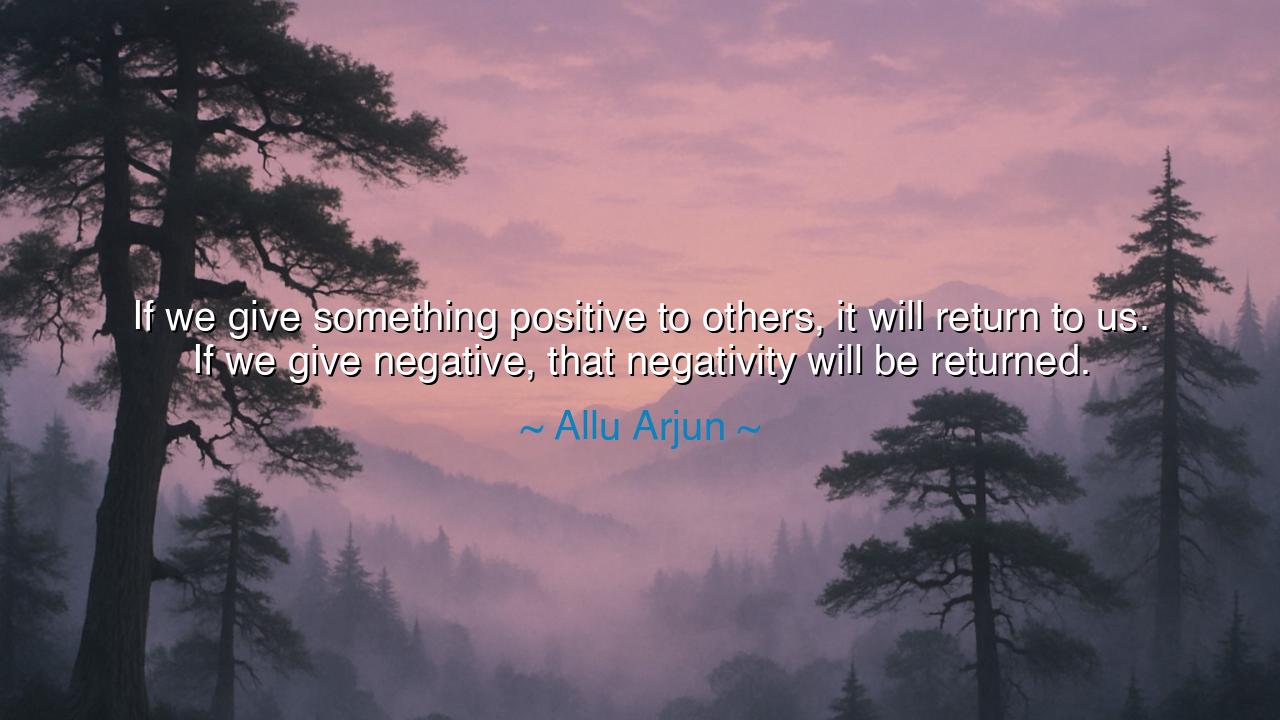
If we give something positive to others, it will return to us.
If we give something positive to others, it will return to us. If we give negative, that negativity will be returned.






Hear the words of Allu Arjun, who spoke with the clarity of one who has looked into the law of life and seen its pattern: “If we give something positive to others, it will return to us. If we give negative, that negativity will be returned.” This is no idle saying, but the echo of an ancient truth spoken across cultures and ages—that what we sow, we reap; what we release into the world will one day circle back and find us again. His words are simple, yet they contain the weight of cosmic justice, reminding us that our actions, whether of kindness or cruelty, ripple outward and return multiplied.
The meaning of this truth is that life itself is a mirror. When we give positivity—encouragement, generosity, compassion—we awaken those same qualities in others, and they flow back toward us in gratitude, trust, and love. But when we release negativity—anger, envy, cruelty—we create a cycle of bitterness that eventually ensnares us. This is not superstition, but the nature of relationships and communities: energy given does not vanish; it builds, it spreads, and it finds its way back to its source.
History offers us a great example in the life of Mahatma Gandhi. When faced with oppression, he chose not to answer with violence, but with nonviolence and truth. The positivity he offered—a spirit of peace and dignity—spread throughout his nation and returned to him in the form of trust, reverence, and lasting change. Had he instead answered with hatred, hatred would have been returned, and his cause destroyed. His life stands as a testament to the truth that the energy we give shapes the destiny we receive.
The origin of Allu Arjun’s words springs from the ancient Indian philosophies that have long taught the law of karma—that every action, word, and thought bears fruit in time. As an artist, beloved by millions, he knows that what he gives to his audience—hope, joy, or despair—returns to him in their devotion. His saying distills this wisdom for all: it is not wealth or fame that builds a legacy, but the quality of energy one pours into the world.
And yet, his wisdom is not only for the great, but for the humble. A smile offered to a stranger may return as kindness when most needed. A harsh word spoken in anger may return as sorrow at one’s weakest hour. Even in families and friendships, this law reveals itself daily: respect creates respect, while contempt breeds contempt. The cycles we set in motion are the cycles that will one day shape our own destiny.
The lesson is clear: guard your actions, guard your words, and guard your heart. If you desire peace, sow peace. If you long for love, give love. If you wish for joy, bring joy into the lives of others. And if bitterness tempts you, remember that to give it is to prepare it for your own table. The world may be vast, but it is also circular, and every energy cast outward will find its way home.
So I say unto you: remember the wisdom of Allu Arjun. Give positivity, and positivity shall return. Give negativity, and it will bind you. Let your life be a wellspring of kindness, even when the world is harsh. Let your words be healing, even when others wound you. For those who live by this law walk in harmony with the eternal rhythm of life, and they shall reap blessings that endure long after their days are done.






PGPhan Giang
Reading this, I’m struck by the simplicity and optimism in the idea of giving positivity to receive positivity. I’m curious whether Allu Arjun thinks the principle applies equally to all forms of interaction, such as online communication or indirect social influence. How does he suggest individuals cultivate positivity in challenging environments where negativity is prevalent? Furthermore, is the benefit primarily internal, enhancing one’s own mindset, or external, affecting how others respond?
TNHoang Thuy Nhu
This quote emphasizes the reciprocal nature of human behavior, which is interesting to consider in social and professional contexts. I wonder if Allu Arjun believes that consistently giving positive energy can influence broader communities or if it mainly affects close relationships. Does he have strategies for maintaining positivity even when faced with persistent negativity from others? It also raises the question of how one protects themselves emotionally while practicing this principle.
TVPham Tuong Vy
I find this perspective inspiring, but it makes me question the complexity of human interactions. Can negativity or positivity really be measured and returned accurately in real life, where circumstances and perspectives vary? I’m curious whether Allu Arjun sees this principle as a lifelong habit or a situational approach. Additionally, how does this philosophy handle situations where kindness or positivity is exploited or misunderstood, potentially resulting in no apparent return?
TQNguyen thi to quyen
This statement makes me think about the idea of karma and how our actions influence not only others but ourselves. I wonder if Allu Arjun believes this is a literal principle or more of a motivational guideline. How can one ensure that positivity genuinely returns, given that other people’s reactions are not always predictable? It also raises questions about the balance between intention and outcome—does the act of giving positively matter more than whether the positivity is returned?